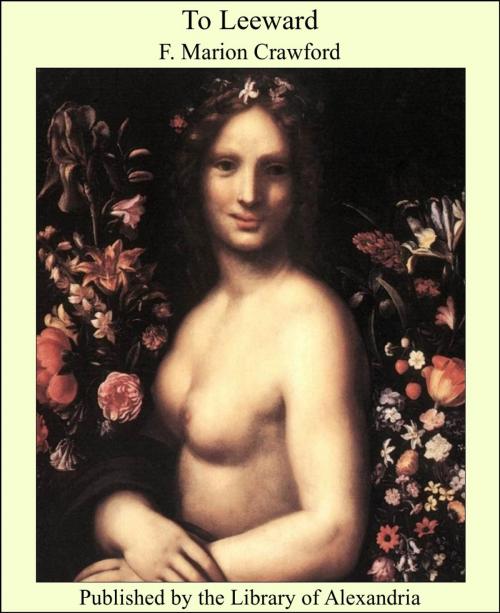| Author: | Francis Marion Crawford | ISBN: | 9781465534712 |
| Publisher: | Library of Alexandria | Publication: | March 8, 2015 |
| Imprint: | Language: | English |
| Author: | Francis Marion Crawford |
| ISBN: | 9781465534712 |
| Publisher: | Library of Alexandria |
| Publication: | March 8, 2015 |
| Imprint: | |
| Language: | English |
There are two Romes. There is the Rome of the intelligent foreigner, consisting of excavations, monuments, tramways, hotels, typhoid fever, incense, and wax candles; and there is the Rome within, a city of antique customs, good and bad, a town full of aristocratic prejudices, of intrigues, of religion, of old-fashioned honour and new-fashioned scandal, of happiness and unhappiness, of just people and unjust. Besides all this, there is a very modern court and a government of the future, which may almost be said to make up together a third city. Moreover, these several coexistent cities, and their corresponding inhabitants, are subdivided to an infinity of gradations, in order to contain all and make room for all. The foreigner who hunts excavations does not cross the path of the foreigner who sniffs after incense, any more than the primeval aristocrat sits down to dinner with the representative of fashionable scandal; any more than the just man would ever allow the unjust to be introduced to him. They all enjoy so thoroughly the freedom to ignore each Other that they would not for worlds endanger the safety of the barrier that separates them. Of course, as they all say, this state of things cannot last. There must ultimately be an amalgamation, a deluge, a unity, fraternity and equality; a state of things in which we shall say, "Sois mon frère, ou je te tue,"—a future glorious, disgusting, or dull, according as you look at it. But, meanwhile, it is all very charming, and there is plenty for every one to enjoy, and an abundance for every one to abuse. When Marcantonio Carantoni saw his sister married to a Frenchman, he was exceedingly glad that she had not married an Englishman, a Turk, a Jew, or an infidel. The Vicomte de Charleroi was, and is, a gentleman; rather easy-going, perhaps, and inclined to look upon republics in general, and the French republic in particular, with the lenient eye of the man who owns land and desires peace first—and a monarchy afterwards, whenever convenient. But in these days it is not altogether worthy of blame that a man should look after his worldly interests and goods; for how else can the aristocracy expect to make any headway against the stream of grimy bourgeois, who sell everything at a profit, while the nobles buy everything at a loss? So Marcantonio is satisfied with his brother-in-law, and just now is particularly delighted because Charleroi has got himself appointed to a post in Rome; and he goes to see his sister every day, for he is very fond of her. In truth, it is not surprising that Marcantonio should like his sister, for she is a very charming woman. She is beautiful, too, in a grand way, with her auburn hair, and grey eyes, and fair skin; but no one can help feeling that she might be quite as beautiful, and yet be anything but charming; so many beautiful people are vain, or shy, or utterly idiotic. Madame de Charleroi is something of a paragon, and has as many enemies as most paragons have, but they can find nothing to feed their envy. She was very unhappy years ago, but time has closed the wounds, or has hidden them from sight, and her dearest friends can only say that she was cold and showed very little heart. When the world says that a woman is a piece of ice, you may generally be sure that she is both beautiful and good, so that it can find nothing worse to say. Marcantonio Carantoni's sister is a paragon, and there are only two things to be said against her,—she did not marry Charleroi for love, and she has not done half the things in the world that she might have done
There are two Romes. There is the Rome of the intelligent foreigner, consisting of excavations, monuments, tramways, hotels, typhoid fever, incense, and wax candles; and there is the Rome within, a city of antique customs, good and bad, a town full of aristocratic prejudices, of intrigues, of religion, of old-fashioned honour and new-fashioned scandal, of happiness and unhappiness, of just people and unjust. Besides all this, there is a very modern court and a government of the future, which may almost be said to make up together a third city. Moreover, these several coexistent cities, and their corresponding inhabitants, are subdivided to an infinity of gradations, in order to contain all and make room for all. The foreigner who hunts excavations does not cross the path of the foreigner who sniffs after incense, any more than the primeval aristocrat sits down to dinner with the representative of fashionable scandal; any more than the just man would ever allow the unjust to be introduced to him. They all enjoy so thoroughly the freedom to ignore each Other that they would not for worlds endanger the safety of the barrier that separates them. Of course, as they all say, this state of things cannot last. There must ultimately be an amalgamation, a deluge, a unity, fraternity and equality; a state of things in which we shall say, "Sois mon frère, ou je te tue,"—a future glorious, disgusting, or dull, according as you look at it. But, meanwhile, it is all very charming, and there is plenty for every one to enjoy, and an abundance for every one to abuse. When Marcantonio Carantoni saw his sister married to a Frenchman, he was exceedingly glad that she had not married an Englishman, a Turk, a Jew, or an infidel. The Vicomte de Charleroi was, and is, a gentleman; rather easy-going, perhaps, and inclined to look upon republics in general, and the French republic in particular, with the lenient eye of the man who owns land and desires peace first—and a monarchy afterwards, whenever convenient. But in these days it is not altogether worthy of blame that a man should look after his worldly interests and goods; for how else can the aristocracy expect to make any headway against the stream of grimy bourgeois, who sell everything at a profit, while the nobles buy everything at a loss? So Marcantonio is satisfied with his brother-in-law, and just now is particularly delighted because Charleroi has got himself appointed to a post in Rome; and he goes to see his sister every day, for he is very fond of her. In truth, it is not surprising that Marcantonio should like his sister, for she is a very charming woman. She is beautiful, too, in a grand way, with her auburn hair, and grey eyes, and fair skin; but no one can help feeling that she might be quite as beautiful, and yet be anything but charming; so many beautiful people are vain, or shy, or utterly idiotic. Madame de Charleroi is something of a paragon, and has as many enemies as most paragons have, but they can find nothing to feed their envy. She was very unhappy years ago, but time has closed the wounds, or has hidden them from sight, and her dearest friends can only say that she was cold and showed very little heart. When the world says that a woman is a piece of ice, you may generally be sure that she is both beautiful and good, so that it can find nothing worse to say. Marcantonio Carantoni's sister is a paragon, and there are only two things to be said against her,—she did not marry Charleroi for love, and she has not done half the things in the world that she might have done















